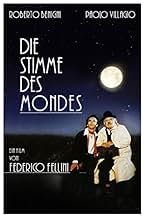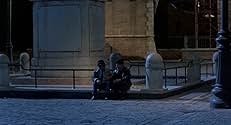ÉVALUATION IMDb
6,3/10
3,4 k
MA NOTE
Ajouter une intrigue dans votre langueThe amusing and entertaining adventures of a recently released mental patient and his band of misfits, who discover conspiracies to participate in while looking for love.The amusing and entertaining adventures of a recently released mental patient and his band of misfits, who discover conspiracies to participate in while looking for love.The amusing and entertaining adventures of a recently released mental patient and his band of misfits, who discover conspiracies to participate in while looking for love.
- Prix
- 5 victoires et 9 nominations au total
Histoire
Le saviez-vous
- AnecdotesEven the original (Italian) dialogue was re-dubbed in order to increase the feeling of unreality. However, this is not a unique feature for this particular movie among Fellini's. On the contrary, it was very common for him to ask his performers to speak out loud randomly chosen numbers instead of the actual script text. Then the main cast would re-dub itself, the supporting cast being most of the time re-dubbed by a few specialized actors. It has to be said that in Italy direct sound wasn't much in use until the French 'Nouvelle Vague' made a massive use of it, in the name of realism, and thus became an example for the Italian film industry. Re-dubbing remained nonetheless a common practice, and an excellent one at that until the 1980s, and Fellini took advantage of its possibilities to increase the feeling of unreality in all of his movies by asking his dubbers (all of them) not to perfectly lip-sync. The only exceptions to this technique are his very early works, where the famous dreamlike world and sensitivity of the director aren't still outlined.
- ConnexionsFeatured in Verso la luna con Fellini (1990)
- Bandes originalesThe Way You Make Me Feel
Written & performed by Michael Jackson
Commentaire en vedette
Probably the only time in cinema where Michael Jackson ("The Way You Make Me Feel" specifically and an inspired dancr sequence) gets a transition into the Blue Danube waltz, and rhsn back again so that's certainly something!
Plotless, rambling, and has more than a few moments where Fellini and his crew place actors and light and setting and music just so to make cinematic poetry: memories as stanzas broken up by the little bits where story appears to be taking place. It sounds contradictory, but what keeps it from being among the filmmaker's best is what is still very interesting about it: Benigni is s man who (after a little time to surmise) is out from a mental hospital and is wandering from town to town, looking for a woman that he adores from his past and interacts with other characters who have their own histories and mysteries and whatnot... And that's it, that's the movie - and all the while, to the director's credit, he gets a real performance out of his star and not merely circus shtick (which is what I assumed many years ago when I first heard of this that it would be).
As with many Fellini, it may just be too much to take in in one sitting, but on the other hand Im not sure I... Care that much about this character and his search for this woman who really doesn't want to see him. And yet, there are brilliant scenes and flashes of greatness through out, wild bits like the one man who gets married and when his wife has sex with him it becomes like being on an actual train that rocks and rolls and creates panedemonium and smoke, or the Blue Danube dance and everyone at the dance breaking out in applause, or that shot where all of those figures with big black garbage cans walk in formation into town. And other times, just as impressively, Fellini slows his usual madman roll snd lets Delli Colli keep the camera more still (or occasionally, something I don't remember from him before, handheld).
At its most enlightening and satisfying, it's a melancholy but entertaining journey through memory and not even desire so much as longing, like tbe ending with Benigni looking up at the moon. It's also about twenty minutes too long (that long sequence in the town square where, uh, suddenly there's a big screen up showing people crying and begging to a fake moon - it really dragged to nothing satisfying), and I wish there was a little more time to understand what the Prefect character was all about as a lost soul. But, even with its flaws, it's still a lovely experience because it's Fellini finding ways to rediscover his passions and interests in exploring memory, regret and the desire to want to fly in the sky, figuratively and literally.
Plotless, rambling, and has more than a few moments where Fellini and his crew place actors and light and setting and music just so to make cinematic poetry: memories as stanzas broken up by the little bits where story appears to be taking place. It sounds contradictory, but what keeps it from being among the filmmaker's best is what is still very interesting about it: Benigni is s man who (after a little time to surmise) is out from a mental hospital and is wandering from town to town, looking for a woman that he adores from his past and interacts with other characters who have their own histories and mysteries and whatnot... And that's it, that's the movie - and all the while, to the director's credit, he gets a real performance out of his star and not merely circus shtick (which is what I assumed many years ago when I first heard of this that it would be).
As with many Fellini, it may just be too much to take in in one sitting, but on the other hand Im not sure I... Care that much about this character and his search for this woman who really doesn't want to see him. And yet, there are brilliant scenes and flashes of greatness through out, wild bits like the one man who gets married and when his wife has sex with him it becomes like being on an actual train that rocks and rolls and creates panedemonium and smoke, or the Blue Danube dance and everyone at the dance breaking out in applause, or that shot where all of those figures with big black garbage cans walk in formation into town. And other times, just as impressively, Fellini slows his usual madman roll snd lets Delli Colli keep the camera more still (or occasionally, something I don't remember from him before, handheld).
At its most enlightening and satisfying, it's a melancholy but entertaining journey through memory and not even desire so much as longing, like tbe ending with Benigni looking up at the moon. It's also about twenty minutes too long (that long sequence in the town square where, uh, suddenly there's a big screen up showing people crying and begging to a fake moon - it really dragged to nothing satisfying), and I wish there was a little more time to understand what the Prefect character was all about as a lost soul. But, even with its flaws, it's still a lovely experience because it's Fellini finding ways to rediscover his passions and interests in exploring memory, regret and the desire to want to fly in the sky, figuratively and literally.
- Quinoa1984
- 12 août 2020
- Lien permanent
Meilleurs choix
Connectez-vous pour évaluer et surveiller les recommandations personnalisées
- How long is The Voice of the Moon?Propulsé par Alexa
Détails
- Date de sortie
- Pays d’origine
- Langues
- Aussi connu sous le nom de
- The Voice of the Moon
- Lieux de tournage
- sociétés de production
- Consultez plus de crédits d'entreprise sur IMDbPro
Box-office
- Brut – à l'échelle mondiale
- 23 222 $ US
- Durée2 heures 6 minutes
- Couleur
- Rapport de forme
- 1.66 : 1
Contribuer à cette page
Suggérer une modification ou ajouter du contenu manquant

Lacune principale
By what name was La voce della luna (1990) officially released in India in English?
Répondre


























